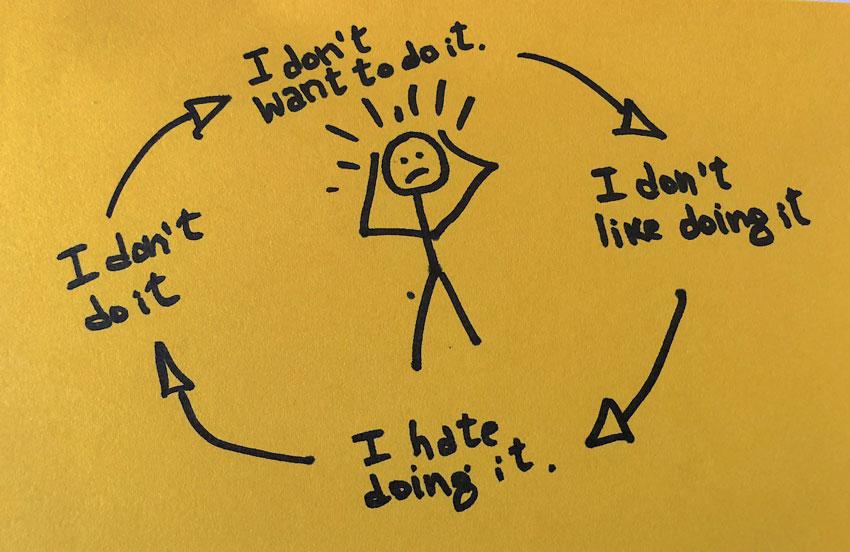10 Apr 2021 - {{hitsCtrl.values.hits}}

 All of us have been guilty of putting off a task at some point in our lives. However, when this type of behaviour becomes a frequent occurrence it starts to hinder our productivity and efficiency. A common trait amongst most procrastinators is difficulty implementing self-control, resulting in them delaying tasks that are complex in nature. This behaviour tends to result in them experiencing a myriad of negative emotions such as stress as a result of not leaving themselves enough time to complete their work, anger at themselves for not learning from past mistakes, and shame as a result of not maximising their potential.
All of us have been guilty of putting off a task at some point in our lives. However, when this type of behaviour becomes a frequent occurrence it starts to hinder our productivity and efficiency. A common trait amongst most procrastinators is difficulty implementing self-control, resulting in them delaying tasks that are complex in nature. This behaviour tends to result in them experiencing a myriad of negative emotions such as stress as a result of not leaving themselves enough time to complete their work, anger at themselves for not learning from past mistakes, and shame as a result of not maximising their potential.
Self-deception is also very common amongst those who procrastinate. They are often aware of the toll their bad time management skills takes on them, however they tend to prefer facing those consequences over putting in the effort to change their learned habits. They rely on the belief that they will be able to complete the task at hand at a later point, despite being aware of the pressure that they will be putting themselves under.
Another interesting factor in understanding the mind of a procrastinator is recognising that procrastinators tend to be perfectionists. Even the smallest task may appear mammoth to them, and it may thus make more psychological sense for them to not deal with the problem instead of facing the possibility of not doing the task well. Procrastinators tend to be worried about how other people may perceive them and their work, and as a result they delay their work for as long as possible to avoid facing this judgment. As a result, they continue to carry out this self-defeating behaviour in order to feel protected against their negative emotions.
 |
 |
Other factors that may lead to procrastinators delaying their tasks include believing that that they will not enjoy them and thus make themselves unhappy, or simply, confusion at the complexity of the task at hand. Research also suggests that apart from perfectionism, procrastinators may suffer with low self-confidence, anxiety, a lack of structure, and fixation on negative thought processes. Furthermore, procrastinators tend to avoid making important decisions, so as not to be burdened with responsibility for the outcome of the said decision.
Many procrastinators tend to claim that they work better under pressure, however existing literature suggests that this is not the case. Rather, research shows that procrastinators will continue to leave their tasks till the last minute in order to experience the satisfaction of overcoming the odds against them. They tend to frequently carry out a process known as affective forecasting, wherein they avoiding feeling bad about not having completed a task one day, by completing it the next day. In this manner they trap themselves in an unhealthy cycle of putting off work for later, until they become accustomed to working under high stress and producing large amounts of output in short time frames.
Research also suggests that procrastinators adhere to a different value system than those who don’t procrastinate. They tend to value personal enjoyment above strong work ethic in both academics and careers, and prioritise tasks they enjoy over those assigned to them. Procrastination is also a relatively common occurrence in teenagers, and this behaviour may be a sign of passive resistance to parental authority.
The consequences of frequent procrastination include a reduced quality of work, insomnia, gastrointestinal disturbance, hypertension, cardiovascular disease, and unstable personal and professional relationships. This is because individuals who procrastinate are more likely to put off visits to the doctor, avoid committing to healthy eating and self-care, and fail to value other peoples’ time. Procrastinators are also at a higher risk of developing depression due to their tendency to carry out avoidance and rumination behaviours.
Fortunately, procrastination does not have to be a lifelong habit. It is possible to overcome such behaviours through cognitive behavioural therapy, building timelines that include time for delay, challenging or incentivising yourself to complete a task by a certain date, breaking a large task down into several more manageable tasks, and limiting the time you spend on social media or other distractors. Procrastinators can also overcome their struggles with decision making by sticking to a set of personal decision-making rules, or outsourcing decisions to a trusted third party in the case that they are unable to decide. It is vital that procrastinators realize the burden they are putting on their future selves by delaying tasks unnecessarily, and that they thus make the necessary efforts to change these behaviours.
08 Jan 2025 1 hours ago
08 Jan 2025 2 hours ago
08 Jan 2025 3 hours ago
08 Jan 2025 4 hours ago